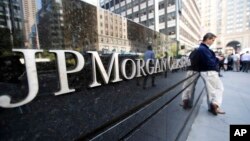The United States has approved new rules to restrict securities trading by banks in a new effort to prevent risk-taking that helped ignite the 2008 financial crisis.
Five U.S. financial regulatory agencies adopted rules Tuesday that will mostly bar banks from making trades for their own profits. The agencies have been debating the regulations for three years, with some of Wall Street's biggest financial institutions voicing their strenuous opposition. The new rules will take effect in the middle of 2015.
Such securities trades have been lucrative for the country's most prominent banks, including JPMorgan Chase, Bank of America and Citigroup. Wall Street critics say the trades also led to risk-taking that forced the government to bail out several big banks to keep them from collapsing during the depths of the recession five years ago.
The new regulations - more than 900 pages - long - have been called the Volcker Rule, named after a former Federal Reserve chairman, Paul Volcker, who first conceived them. In 2010, Congress approved wide-ranging new controls on U.S. financial institutions and ordered regulators to draft the securities trading rules.
Supporters of the rules say it will make the financial system safer and prevent abuses by big banks, while still allowing them to make trades on behalf of customers. Bank opponents of the rules say they will hurt the broader economy by curbing their profits and limiting some of the biggest securities trades in the U.S.
The agencies that have approved the regulations are the Federal Reserve, which is the U.S. central bank, the Federal Deposit Insurance Corporation; the Securities and Exchange Commission; the Commodity Futures Trading Commission; and the Office of the Comptroller of the Currency.
Five U.S. financial regulatory agencies adopted rules Tuesday that will mostly bar banks from making trades for their own profits. The agencies have been debating the regulations for three years, with some of Wall Street's biggest financial institutions voicing their strenuous opposition. The new rules will take effect in the middle of 2015.
Such securities trades have been lucrative for the country's most prominent banks, including JPMorgan Chase, Bank of America and Citigroup. Wall Street critics say the trades also led to risk-taking that forced the government to bail out several big banks to keep them from collapsing during the depths of the recession five years ago.
The new regulations - more than 900 pages - long - have been called the Volcker Rule, named after a former Federal Reserve chairman, Paul Volcker, who first conceived them. In 2010, Congress approved wide-ranging new controls on U.S. financial institutions and ordered regulators to draft the securities trading rules.
Supporters of the rules say it will make the financial system safer and prevent abuses by big banks, while still allowing them to make trades on behalf of customers. Bank opponents of the rules say they will hurt the broader economy by curbing their profits and limiting some of the biggest securities trades in the U.S.
The agencies that have approved the regulations are the Federal Reserve, which is the U.S. central bank, the Federal Deposit Insurance Corporation; the Securities and Exchange Commission; the Commodity Futures Trading Commission; and the Office of the Comptroller of the Currency.
